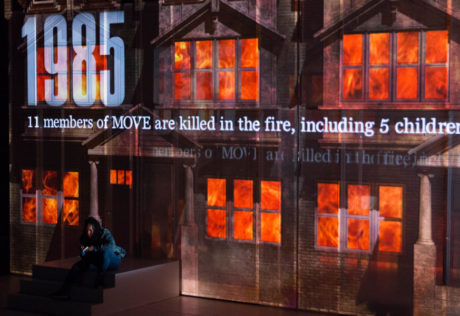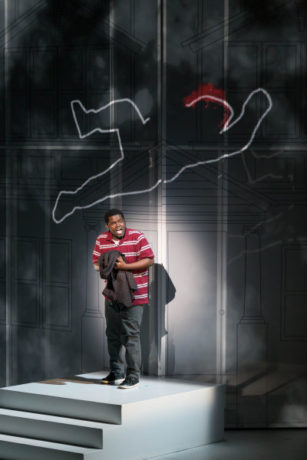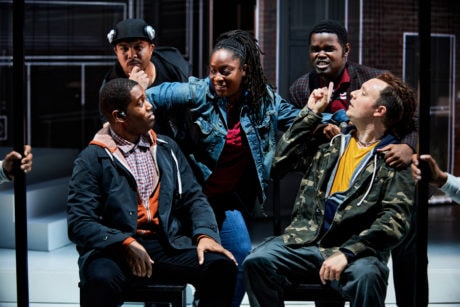The sole Philadelphia-based offering in Opera Philadelphia’s O17 Festival is We Shall Not Be Moved. Its powerful message is that the city’s children, and particularly its black children, are deprived of decent education, housing and safety. The message is delivered with stirring music, impressive direction and excellent performances.

This message is linked to the tragic fact that these same issues existed three decades ago when promises were made to improve conditions, yet there’s been little progress.
The production relies too much on a remembrance of a series of episodes that is usually called “the MOVE bombing.” That focus is reinforced by including the word “move” in the opera’s title, and by statements issued by some of the opera’s creators. While there is poignancy in showing the lack of improvement between 1985 and today, this opera is weakened by its obsession on one family in one house.
Those of us who were familiar with the neighborhood in 1985 (I was a working journalist) remember that the incident was precipitated when a group headed by John Africa moved into 6221 Osage Avenue in West Philadelphia and frightened its black neighbors by hanging animal carcasses outside their home, erecting barricades, building a fortified bunker on their roof and broadcasting loud messages on bullhorns day and night. Police obtained indictments and ordered the group to exit the building, which they did not.
There was precedent for government using force against U.S. citizens on U.S. soil. What was different here was that the neighborhood consisted of attached row houses. Despite that distinction, two bombs were dropped on the headquarters and the resulting fire was allowed to rage until it destroyed 65 adjoining homes and 11 lives. The residents of that block were the innocent victims, and their plight was exacerbated when the city replaced their former homes with substandard housing.

The text of We Shall Not Be Moved sanctifies the MOVE group as if it was an innocent victim, identifying it as a “green” organization when it was far from being an environmental protection group. The libretto says that children were “murdered” and the composer, in the program, contrasts the “lawlessness of law enforcement” against the MOVE family who “fought for their lives.” To the extent that this point of view is emphasized, the opera suffers.
Director and choreographer Bill T. Jones says “This is not a polemical work” and the libretto says “It is true we are not innocent and also true that we are victims.” When the opera maintains that balance, it moves us.
Five homeless teenagers run away from the violence in one Philadelphia neighborhood and decide to become a family. Of the five, one is a transgender man and one is a white man who identifies himself with the others. They drop out of school (whose doors are locked anyway) and occupy a vacant house on Osage Avenue, where they encounter ghosts from the 1985 tragedy. They are confronted and charged with trespassing by a Hispanic cop who describes herself as “a brown girl who bleeds blue.”
The trans, John Blue, is especially appealing as he broadens the message of identity based on color into an exposure of bigotry based on any deviation from what any individual perceives as alien. Tenor John Holiday, as Blue, sings, “Gender boxes are cages / I want to fly free / It hurts to be still in this body / A crossroads of violence and guilt and gender.”
We Shall Not Be Moved indicts city authorities, police, school system, and also the parents of homeless kids. As one of the characters sings, the children are “Little blackbirds caged in your dark little world / At an age where all your black girl dreams should see the daylight.” The narrator adds, “No corner is safe, not jail, not school, not the corners where we’ve hung.”
Marc Bamuthi Joseph’s words are poetic and mesmerizing. Daniel Bernard Roumain composed a sophisticated score that melds chain gang, soul, funk, minimalism, blues, and a bit of traditional opera into a cohesive whole. He eschewed the easy way of using imitative cliches and produced a haunting tapestry of sound, which was played by a versatile band led by Viswa Subbaraman. Jones, too, created original movements of pain and struggle that did not imitate his famous earlier work.
Projections by Jorge Cousineau play a large role in depicting Philadelphia’s neighborhoods. Matt Saunders designed the simple sets and Liz Prince the contemporary costumes.
Lauren Whitehead is expressive as Un/Sung who communicates primarily through spoken words. Aubrey Allicock is charismatic with powerful baritone singing as John Henry. Kirstin Chávez impresses with her rich mezzo voice as Glenda the cop. Daniel Shirley, Adam Richardson, Michael Bishop, Duane Lee Holland Jr, Tendayi Kuumba and Caci Cole Pritchett complete the cast.
Running time: Two hours and 5 minutes, including one intermission.

Holiday, Daniel Shirley, and Adam Richardson. Photo by Dave
DiRentis.
We Shall Not Be Moved played through September 24, 2017 at Opera Philadelphia, performing at the Wilma Theater — 265 S. Broad Street, in Philadelphia, PA. Tickets to other O17 events can be ordered online.
Following this world premiere, We Shall Not Be Moved travels to the Apollo Theater in New York October 6 and 7. Tickets to these performances can be ordered online.




